The Coalition has made more than a few changes to how Gears 5 plays — some good, some… not so good, and some downright divisive. Thanks to last weekend’s multiplayer tech test, we’ve gotten tones of new footage, gameplay, and opinions to pore over.
So here are the 5 biggest changes to Gears 5, specifically to how the multiplayer looks and feels.
Arcade Mode
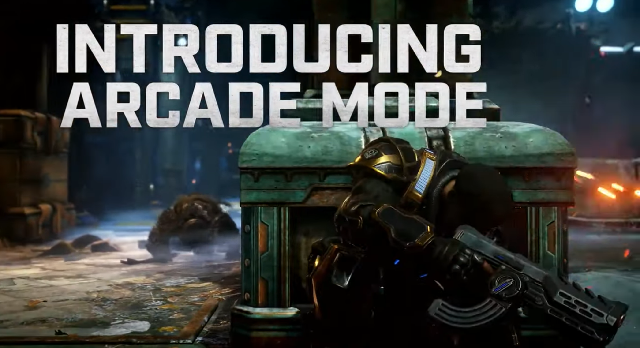
The first big addition to Gears 5 is the new Arcade mode. In Arcade mode, you earn skulls for Eliminations — whether that’s kills, assists, or executions. In turn, these skulls can be cashed in for new weapons on the battlefield.
It already looks like a lot of fun, and we’ve barely had a taste of it. Not only is it a faster-paced game mode with more explosions, blood, and bullets that the regular multiplayer offerings, but it has a number of unique feathers in its cap.
You’d think that the nature of earning weapons could be punishing, what if you save for a power weapon only to die immediately? Thankfully, The Coalition has added a Mulligan system to Arcade mode to prevent this grief, which will refund spent skulls if you die shortly after purchasing a weapon that you don’t get to use.
The Coalition has stated Arcade Mode is inspired by Gears 4‘s Arms Race mode, which served as a great way for players to learn new weapons and kept a loyal playerbase around for longer.
It’s particularly interesting to see JD’s character in Arcade, which has to gamble skulls on randomized weapon drops. That’s also a great segue into the second big change: the unique character perks.
Class Perks
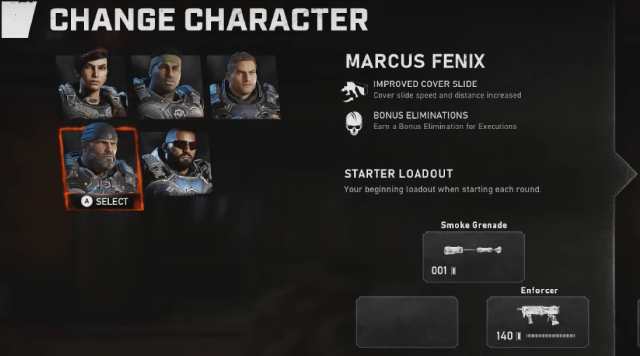
Okay, this one’s cheating a little, because it’s technically part of Arcade mode, but it feels like a big enough change that it deserves its own section.
As you can see from the image above, which character you choose to play as will have unique effects on your gameplay.
Marcus has greater distance and speed on his cover slide, Kait has improved movement speed, and Fahz won’t flinch when aiming down his sights. That last one, in particular, is important, as it can be the difference between landing those sweet headshots with your Longshot or whiffing them entirely. Each class also starts with different weapons and will have different weapons to purchase using Arcade mode’s skulls currency.
Personally, I’ve never really been one for cosmetics, especially in Gears where most Locust grunts look identical, so this is a great change to see. Giving meaningful differences to which character you play adds a layer of tactical decision making and freedom for the player.
Now, this only applies to Arcade mode at the moment, so don’t worry if you prefer the level playing field of classic Gears multiplayer, but it’s possible we could see these apply to Horde and Escape modes too, which would be brilliant.
Weapon Changes
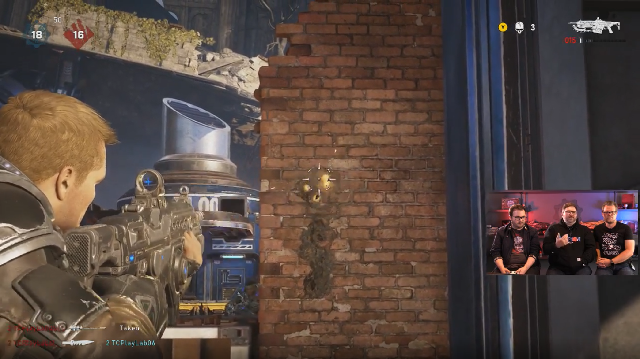
There’s a number of visual and mechanical differences to how weapons perform in Gears 5, including hit markers, recoil patterns, and active reloads.
Starting from the top, we can see an example of the predictable recoil pattern for the Lancer in Gears 5 in the image above. Hardcore players can now put the time into learning these recoil patterns and how to properly compensate for them if they want to maximize their damage potential.
This applies to other weapons, too, with The Coalition stating that a good number of weapons in Gears 5 have increased recoil. The exact numbers are still being tweaked, so hopefully, this will land somewhere that rewards skilled play but doesn’t spoil the casual experience.
Moving on, we also now have hit markers, which is most impactful — and easily noticeable — on the Gnasher. You can see in the image below that white dots show where the individual Gnasher pellets have hit your target. This makes it easier for players to learn the spread of the weapon, and removes some of the mystery around “That shot hit, why didn’t they die?”
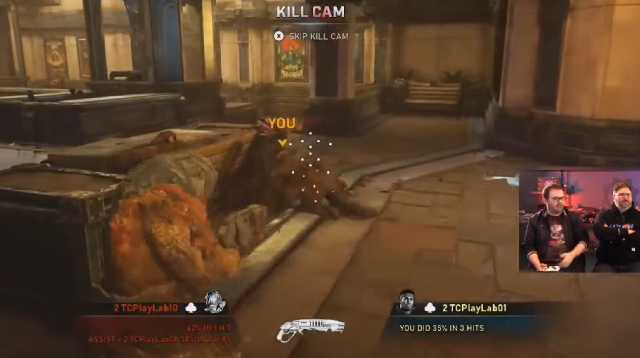
Finally, the active reload system has also changed for some weapons, most notably again for the Gnasher. To remove some of the unpredictability of shotty fights, The Coalition has removed bonus damage from the Gnasher’s active reload in Gears 5.
Instead, timing the active reload correctly simply reloads the weapon faster; timing your active reload in the grey section quickly reloads 3 shots, timing it perfectly in the white refills the full 6 shells, or you can just leave it to reload manually.
All of these changes are likely to split fans. Personally, I’m not a fan of the active reload changes — the active reload system defines Gears combat for me, it’s a big part of what makes it so gratifying and engaging. I do understand the concern around maintaining a fairer system, though, so we’ll just have to see how these changes pan out in the long run.
HP Bars & Damage Numbers
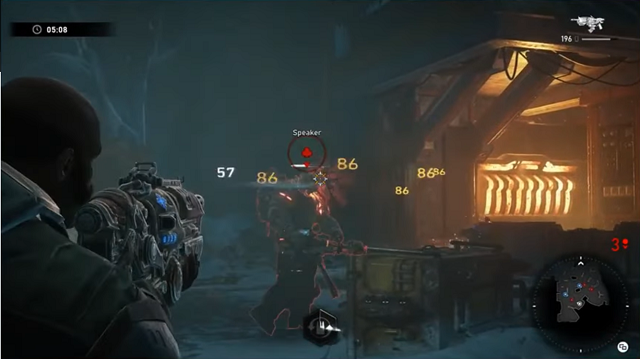
The addition of HP bars and — more importantly — damage numbers to co-operative game modes is possibly my favorite change of them all.
As a massive fan of Horde mode, this change is perfect not only for understanding the damage that your weapons can output but for knowing how your loadout will affect your build.
If a card effect gives you 50% bonus damage, it’s now far easier to visualize the difference, making it instantly rewarding to the player. Guessing the maths behind stat changes can be a headache, so this will make it much easier to tailor your loadouts optimally.
It’s also a godsend for boss waves; previously, you’d just have to plow ammo into bosses, hoping you were close to killing them. Now there’s no guessing involved, you can see a boss’s HP bar!
I may be biased here, as a big fan of the looter shooter genre, but this is an incredibly welcome change. It doesn’t change the classic versus multiplayer feel at all but gives the co-operative modes a breath of fresh air.
New Inverse Omen
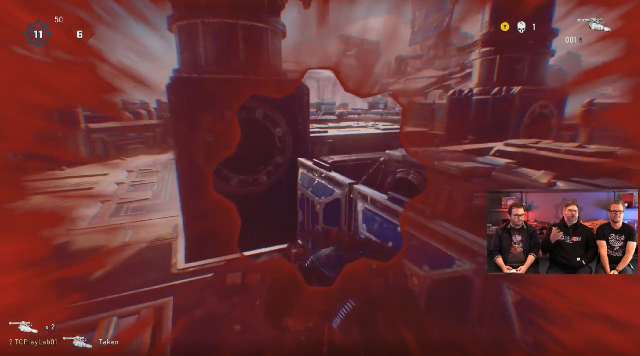
Last but not least, the big one: the Inverse Omen, as The Coalition calls it. The original Omen — referring to the cog-shaped skull icon that appears in the center of the screen to show damage — has been in the Gears series since its inception almost 15 years ago.
But no more. As you can see from the above image, they’ve replaced the Omen in Gears 5 with an Inverse version that reddens on the outside of the screen to show damage, rather than the center.
The reasoning for this is twofold: firstly, the new Inverse Omen is (meant to be) better for gunfights. In early testing, the original Omen became too obtrusive when trying to win head-on fights, as it got in the way of your aiming reticle.
This has been raised as an issue in the past, but The Coalition has specifically stated that it was exacerbated by the recoil patterns added to Gears 5.
On top of this, the new Inverse Omen is a better way of showing the new systems, allowing for health damage, Frozen status, and Stim to all be clearly represented to the player.
As there are now 3 systems that use the Inverse Omen, not just HP damage, it became impossible to show everything with just a small icon in the center of the screen. You can see an example of how the new Frozen Status is displayed, below.
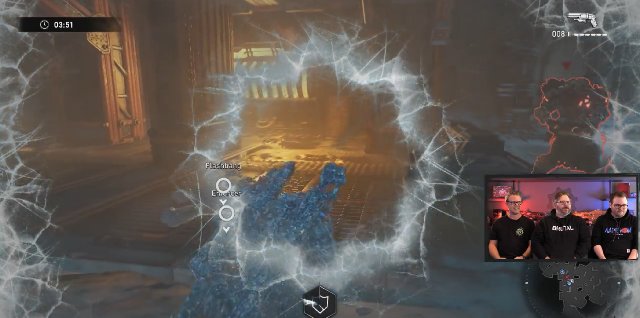
The developers have admitted in livestreams that they knew this change would be somewhat controversial, but it was one they had to make to maintain clarity for their new systems. By switching to the Inverse Omen, though, they were able to add these new gameplay features, so I’m all for it.
There’s certainly been a lot of friction online about the newer version blocking more of the screen and making it harder to see, but even this has been addressed by the developers.
There have been numerous accounts of people hating the change until they got hands-on with it, before quickly adapting to it and realizing it’s a superior system. So while this change may be the most divisive difference in Gears 5, in time, we’ll probably come to see it as one of the best.
For more on Gears 5, why not read about the new Tour of Duty and Supply Drops, or the recent news surrounding tobacco usage in the Gears franchise?







Published: Jul 23, 2019 08:34 am